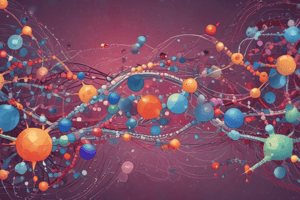Podcast
Questions and Answers
What is a wild type allele?
What is a wild type allele?
- A common allele found in wild and natural populations (correct)
- A mutant allele that is recessive
- A mutant allele that is dominant
- A rare allele found in natural populations
What is the result of a forward mutation?
What is the result of a forward mutation?
- A mutant allele becomes more dominant
- A mutant allele reverts back to wild-type
- A wild-type allele becomes more recessive
- A wild-type allele changes to a mutant allele (correct)
What is the cause of mutations in an organism?
What is the cause of mutations in an organism?
- Errors in DNA replication during cell division
- Exposure to mutagens only
- Viral infection only
- All of the above, and more (correct)
What is the classification of mutations based on?
What is the classification of mutations based on?
What is a reverse mutation?
What is a reverse mutation?
What type of mutation occurs when a purine is replaced by another purine?
What type of mutation occurs when a purine is replaced by another purine?
What is the term for a single base substitution or deletion?
What is the term for a single base substitution or deletion?
What type of mutation results in the loss of a block of one or more base pairs from DNA?
What type of mutation results in the loss of a block of one or more base pairs from DNA?
What type of mutation involves the rotation of a segment of DNA by 180°?
What type of mutation involves the rotation of a segment of DNA by 180°?
What type of mutation occurs when parts of two non-homologous chromosomes exchange places?
What type of mutation occurs when parts of two non-homologous chromosomes exchange places?
Flashcards are hidden until you start studying
Study Notes
Mutations
- A mutation is a change in a DNA sequence of an organism
- Types of alleles:
- Wild type allele: common in wild and natural populations
- Mutant allele: can be recessive or dominant
- Causes of mutations:
- Errors in DNA replication during cell division
- Exposure to mutagens
- Viral infection
- Types of mutations:
- Forward mutation: changes a wild-type allele to a different allele
- Reverse mutation: causes a novel mutant allele to revert back to wild-type
Types of Mutations
- Substitution: replacement of a base by another base
- Transition: purine replaced by another purine, or pyrimidine replaced by another pyrimidine
- Transversion: purine replaced by a pyrimidine, or pyrimidine replaced by a purine
Other Types of Mutations
- Point mutation: a single base is substituted/deleted or changed
- Deletion: a block of 1 or more base pairs is lost from DNA
- Insertion: a block of 1 or more base pairs is added to DNA
- Inversion: a segment of DNA is rotated 180°
- Reciprocal translocation: parts of two non-homologous chromosomes exchange places
Studying That Suits You
Use AI to generate personalized quizzes and flashcards to suit your learning preferences.




